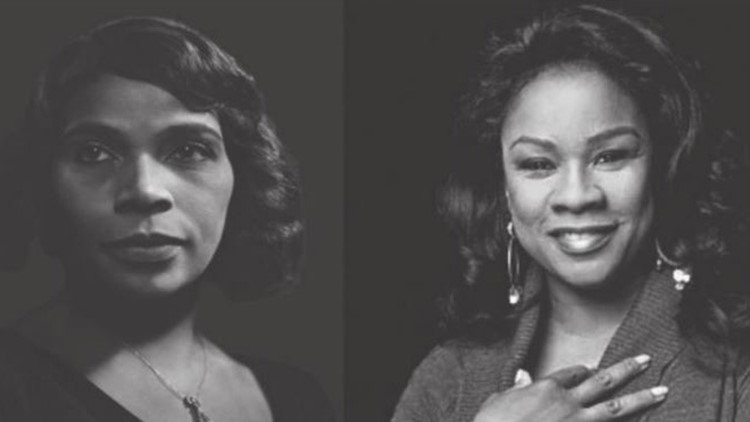Before she was an internationally acclaimed soprano and recipient of the famed Grand Prix Lyrique distinction, Denyce Graves was a fourth grader in Washington, D.C. discovering the woman whom she later counted amongst her heroes.
“I learned about Marian Anderson during Black History Week – that was before it was Black History Month,” Graves said.
Graves was paying the lesson she learned so many years ago forward as she spoke to area students via Zoom for a “Trailblazers in Opera,” Black History Month event on February 18.
The talk and masterclass hybrid which also featured her giving valuable tips and tools to students of opera – including Normandy High School senior Margaret Mischeaux – was a joint effort by Opera Theatre of Saint Louis and the Des Lee Fine Arts Education Collaborative. Mischeaux is a third-year student with the OTSL Bayer Fund Artists-in-Training program. UMSL E. Desmond Lee Endowed Professor of Music Education, Michael Smith, and OTSL Director of Education and Community Engagement, Allison Felter, hosted the virtual event.
Graves was eager to share what she learned as a youngster with those developing their own passion for classical music. Fifteen years after being denied the opportunity to perform at Constitution Hall – which set the stage for the awe-inspiring 1939 performance on the steps of the Lincoln Memorial – Anderson became the first African American to sing at the Metropolitan Opera House.
She was also excited to discuss being selected for the Marian Anderson Prize. Ironically, Graves’ talk came just a few months shy of the 30th anniversary of her being bestowed with the honor. With the award came the invaluable opportunity to meet Ms. Anderson as well as perform for a special concert in Anderson’s hometown of Danbury, Connecticut.
“For me it was if I had stepped into the history books,” Graves said. “[I thought] I learned about you when I was a little girl.”
Graves was admittedly nervous when she was hosted by Anderson at her home. “For us – African American opera singers – she remains the godmother of opera,” Graves said. She was so unsettled that her nerves compelled her to use the restroom. “As I was leaving the ladies room, I could hear the clicking of a walker,” Graves said. It was followed by a booming voice. “‘Are you Denyce Graves?’,” the voice said, according to Graves.
“It was the biggest, the roundest, the most resonant, that makes your heart feel like it is going to break through your chest cavity,” Graves said. “I turned around to see this really tiny, frail woman and somehow the power of that voice was still very much intact. It didn’t fit the vessel that it was coming out of.”
As the two singers spent time together, Graves relished in the opportunity to learn about “Marian Anderson, the woman.” “We all knew about her as the great and mighty artist that she was,” Graves said. “She was herself quite a shy woman – very unassuming. She said to me that she didn’t want to become the face of the Civil Rights Movement.”
But her voice had the power to compel then First Lady Eleanor Roosevelt to act in her defense. Upon hearing the news of Anderson’s denial, Roosevelt resigned from the DAR and played a role in coordinating the 1939 outdoor Easter concert on the National Mall that was attended by 75,000. Graves was tapped to reenact the iconic performance in commemoration of the concert’s 70th Anniversary in 2009.
“She had this wonderful instrument that carried with it so much DNA of who she was and what was in her heart – and that was that she really wanted everyone to unite and love and respect each other,” Graves said. “I swear you can hear that in her singing. One of the things that makes singing so great and music so great is that it is a universal language and it is a great unifier. It reaches us in places that words cannot.”
Graves felt tremendously honored and privileged to sit across the table from Anderson and talk about what was important to her. Anderson paved the way for so many in the field of opera, including St. Louisans Robert McFerrin – who was the first African American to sing at the Met – and fellow diva Grace Bumbry.
Graves shared with the audience that she had a “delightful” phone conversation with Bumbry, and they discussed Anderson’s contributions – which served as a precursor of sorts to the talk and masterclass.
They discussed what it must have been like for Anderson to attempt to share her gift with the world, only to be met with racial terror.
“It took a tremendous amount of spiritual strength and tenacity and having a foundation and strength,” Graves said.
Graves felt that Anderson being reared in the church was no accident in preparation for the doors she was forced to open and ceilings she had to break as a pioneering Black woman opera singer.
“She needed to have that foundation and strength for her journey,” Graves said. “To be able to withstand everything that was coming against you from everybody, it was incredibly difficult. But I will say this: When she opened her mouth to sing, that changed the people’s hearts.”


